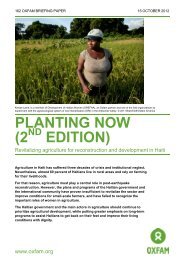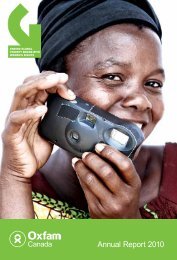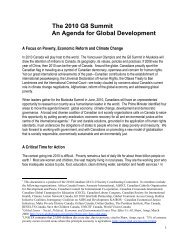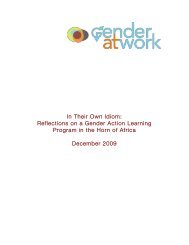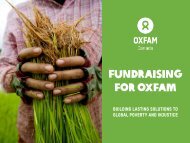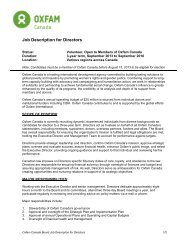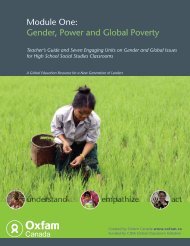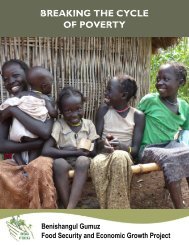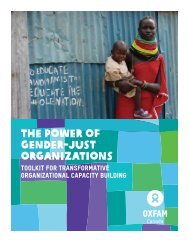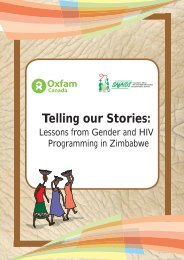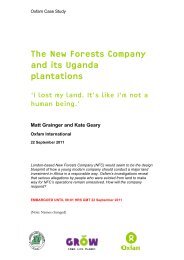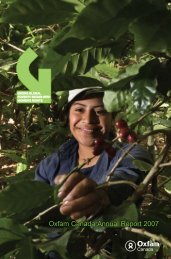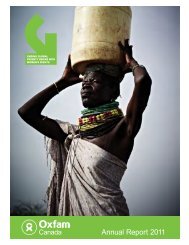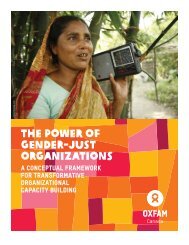Annual Report 2012 - Oxfam Canada
Annual Report 2012 - Oxfam Canada
Annual Report 2012 - Oxfam Canada
Create successful ePaper yourself
Turn your PDF publications into a flip-book with our unique Google optimized e-Paper software.
The GROW campaign<br />
In June 2011, <strong>Oxfam</strong> launched a new, four year campaign,<br />
GROW. The campaign’s aim is to tackle the failings in the<br />
global food system. Almost a billion of us go to bed hungry<br />
every night, the majority women and girls. This isn’t because<br />
there isn’t enough food, but because of deep imbalances in<br />
opportunity and control of resources. Women are responsible<br />
for the majority of food production in many developing<br />
countries but they are the least likely to have access to<br />
markets, land and credit.<br />
We’re working to create a movement of people to build a<br />
future where everyone on the planet has enough to eat,<br />
always. We’re focusing on four interlinked aspects of<br />
the global food system that contribute to world hunger,<br />
particularly for women:<br />
Land grabs: These unfair deals by powerful countries and<br />
companies are forcing poor farmers and communities from<br />
their land. We want to change the policies of governments<br />
and companies and give farming communities the support<br />
they need to thrive.<br />
Food price volatility: In the current economic climate<br />
everyone has noticed increases in food prices, but for the<br />
world’s poorest people, who spend 80 per cent of their<br />
income on food just to survive, any increase has devastating<br />
effects. GROW targets the key causes of volatile food prices<br />
that make food unaffordable, such as the use of land for<br />
biofuel rather than for food, and food speculation where big<br />
banks bet on the prices of staple foods, increasing prices.<br />
Supporting sustainable farming: <strong>Oxfam</strong> continues to support<br />
farmers to grow food in a sustainable way through our<br />
livelihoods programs and the GROW campaign. For our world<br />
to grow together, we need to change the way the world<br />
thinks about farming. We want to see more investment and<br />
support for small-scale farmers so they can produce food in<br />
a sustainable way.<br />
Climate change: Climate change and extreme weather<br />
conditions which wipe out crops are having a major effect<br />
on the world’s food resources. Our programs enable<br />
communities to adapt to the changes in their environment<br />
that affect their ability to feed themselves.<br />
GROW is an ambitious campaign, but in an age where we’re<br />
more connected than ever, we’ve seen the changes that<br />
people can achieve when acting together.<br />
International Women’s Day<br />
March 8, <strong>2012</strong>, marked the 101st International Women’s Day.<br />
In an amazing show of solidarity around the world, <strong>Oxfam</strong><br />
and our partners demonstrated our ongoing commitment<br />
to women’s rights, drawing attention to the issues through<br />
events, actions, marches and panels. Here are a few<br />
examples:<br />
• In Bangladesh, <strong>Oxfam</strong> held film screenings, meetings<br />
and press conferences across five divisional centers to<br />
highlight the issues facing women in Bangladesh.<br />
• In Myanmar, <strong>Oxfam</strong> and the Women Protection Technical<br />
Working Group celebrated the Day with the Department<br />
of Social Welfare. This group then met with officials from<br />
other key ministries to discuss proposed initiatives related<br />
to national strategic plans for the advancement of women<br />
in Myanmar.<br />
• In Nicaragua, a group of women’s movement actors<br />
composed of more than 20 feminist organizations and<br />
numerous individual women, participated in a national<br />
march and communicated their messages with stickers<br />
and signs promoting the women’s movement.<br />
• In <strong>Canada</strong>, <strong>Oxfam</strong> promoted the voices of women, small<br />
scale farmers and producers around the world through a<br />
series of local events in communities across the country,<br />
challenging Canadians to help fix the broken food system.<br />
Zimbabwe: Ipaishe had<br />
enjoyed a simple life until<br />
her husband died. She was<br />
one of the first to recieve<br />
a plot to farm. She cycles<br />
the 6 km to the field. “I<br />
have always longed to<br />
own a piece of land where<br />
I can satisfy my desire for<br />
farming. It’s a dream come<br />
true.”<br />
Annie Bunderoth/<strong>Oxfam</strong><br />
<strong>Oxfam</strong> CANADA 5 ANNUAL REPORT <strong>2012</strong>



